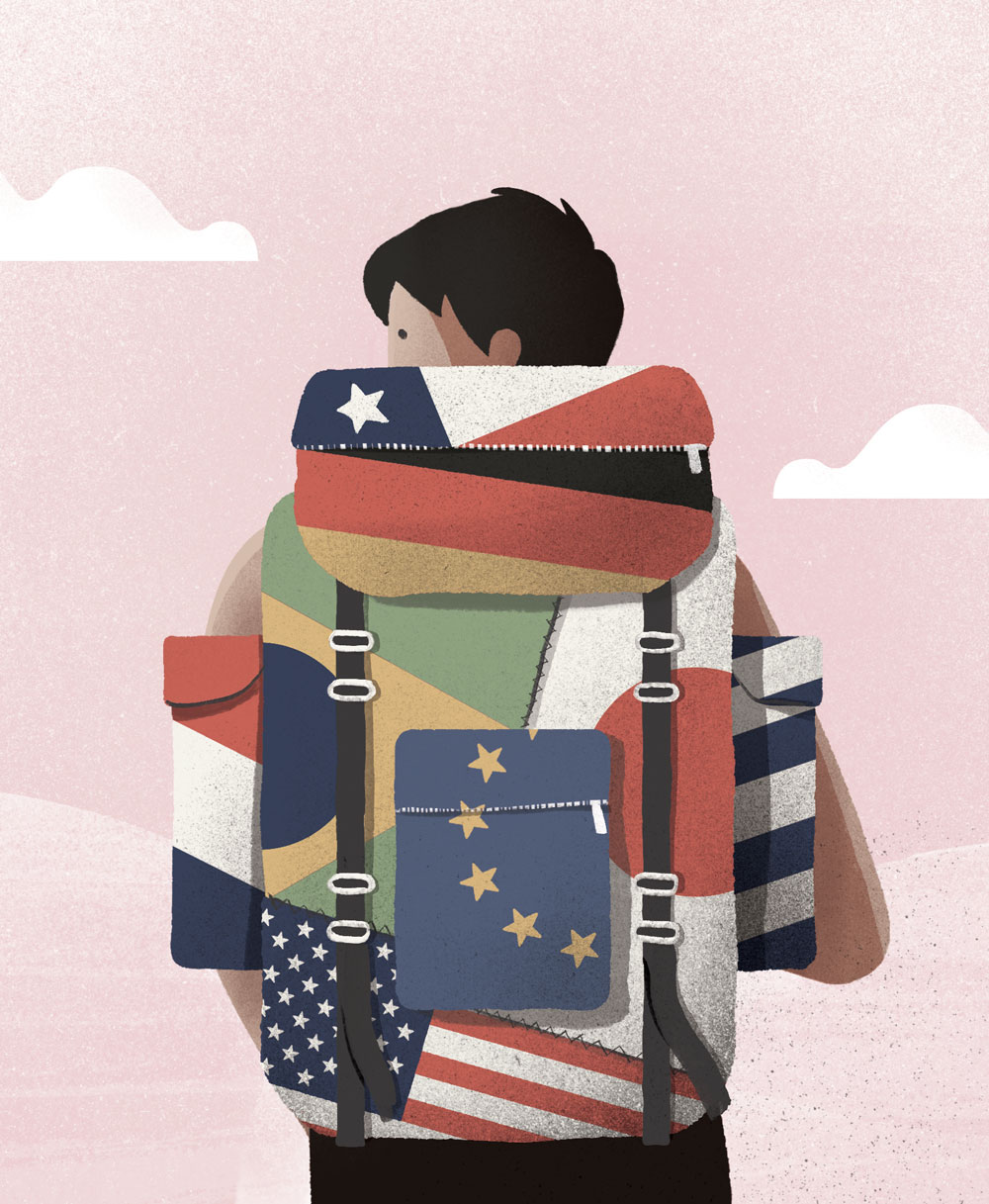

Beyond Borders
Larry Clow ’12G
ILLUSTRATION BY
Paul Reid
“I said in Korean, ‘Can I sit here?’ and the person said yes,” Paolini recalls. “But when I talked to my Korean friend later, they said, ‘Whoa, you did that? That is so not a Korean thing!’”
“I pushed myself to meet locals, even though I had minimal Korean language skills. I came up with reasons to practice the language and meet people,” she says.
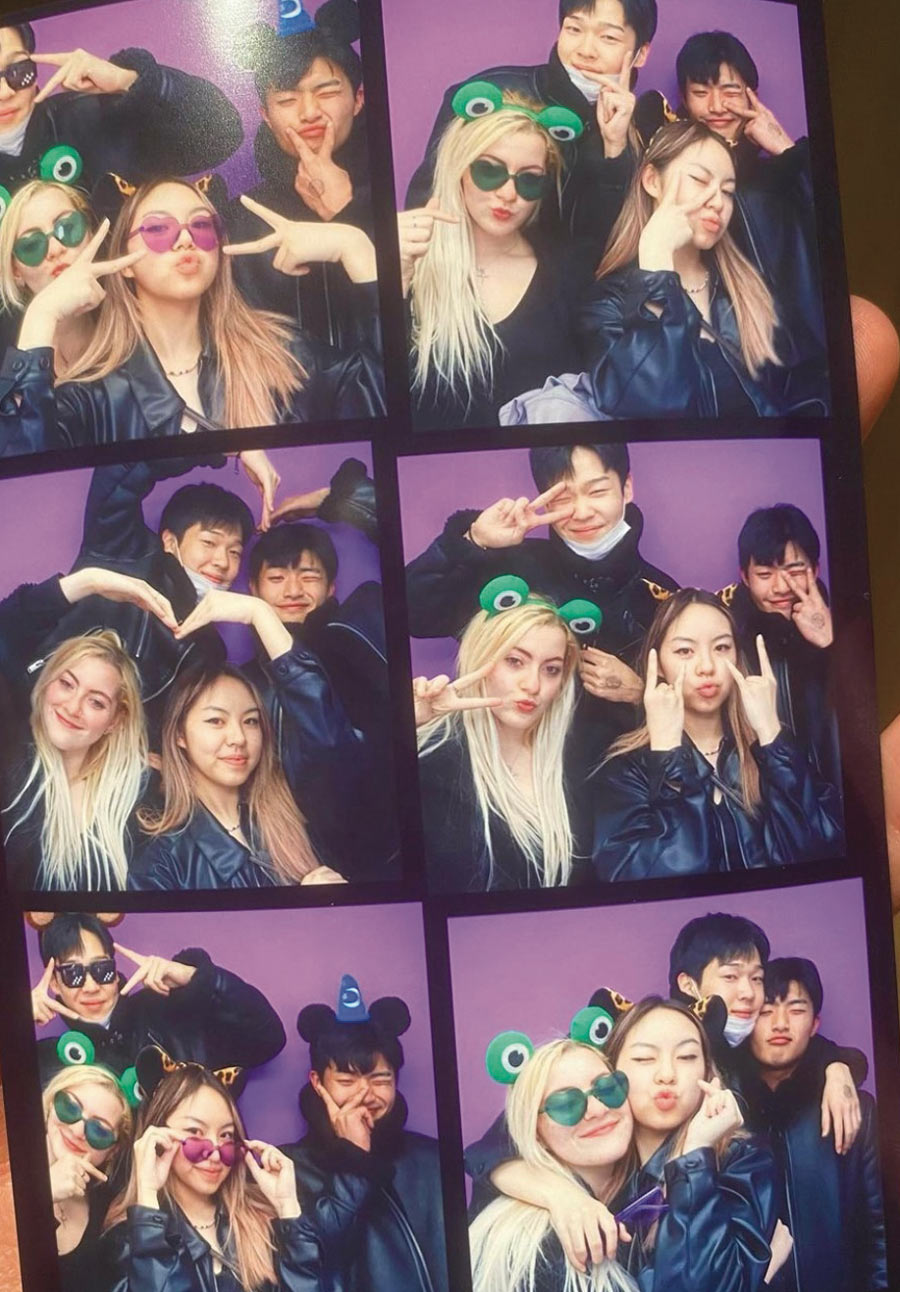
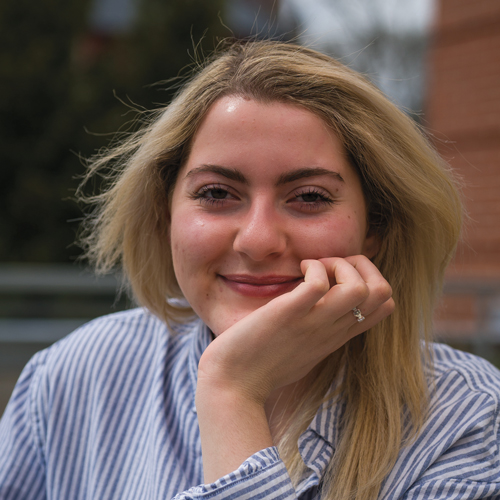
During the last two years, the COVID-19 pandemic has transformed the study abroad experience. While vaccines, masks, and other precautions have helped students return to international travel, COVID variants, outbreaks, and sudden restrictions have made already-complicated logistics more difficult. And yet, students like Paolini remain undaunted. Faced with the dual challenges of a global pandemic and life in an unfamiliar country, they’ve persevered and adapted — and, along the way, found new friends, new career paths, and a new sense of self.
The Urgency of Experience
Now the interim director of UNH’s Education Abroad program, Meijer can easily list the material benefits of study abroad programs. Students who study abroad are more likely to finish college, and they’re at an advantage when it comes to searching for jobs. According to Meijer, the skills students develop when studying overseas are in-demand among employers.
But more important, she says, are the internal changes that students go through when they leave home for a semester and begin their journeys as global citizens. For some, it’s the sense of maturity that comes with having to make difficult decisions far from home and without a familiar support network. For others, it’s a newfound international awareness. Students have returned to Durham surprised at how people in their host country view the U.S.
“It may sound corny, but ultimately, that idea of world peace is the goal we’re all working toward. Especially now, with the pandemic, it’s important to have a little more understanding for each other and respect for one another’s perspectives, and to just be kind. And in that sense, the study abroad experience has become even more urgent in the world we’re living in.”
Meijer believes it’s an experience that ignites change and spurs lifelong learning. In fact, even after 18 years in America, she’s still learning. “I always tell students that just because you’ve gone abroad for three months, you’re not an expert, you’ve only scratched the surface. I’ve been here 18 years and I’m still learning and that’s what’s so cool about it.”
Coffee Orders and Cultural Adjustments
“That’s all I knew how to order, but I still couldn’t get the Korean words right,” she says. “The baristas were trying to figure out what I wanted, and I just kept trying.”
The city was also under a 9 p.m. curfew due to COVID restrictions. But locals still gathered in the streets, and Paolini joined them. “I tried to get the most out of my experience any way I could,” she says. Along the way, she met Jaewon Kim, who became a fast friend.
“He had a Vespa, and so he took me around Seoul,” she says. “It was like a movie — he’d put on some French cafe music and we’d put on our helmets and ride around the city.” The two zipped across Seoul, visiting cat cafes and “Squid Game” pop-up exhibits for the popular Netflix series in the city, and went to the port city of Busan on Thanksgiving.
Meeting Jaewon’s parents presented other cultural challenges, though. “My family is Italian and really affectionate, but in Korea, there’s more of a physical separation, even when you’re around the dinner table,” she says. When the visit ended, Paolini, who would normally hug someone goodbye, was at a loss. “I waved and said goodbye, and when I asked Jaewon how it went, he said, ‘Good, but it’s kind of disrespectful to wave goodbye to an elder.’ I usually show my affection with friends and family physically, so it was a cultural adjustment I had to make.”
Adapting meant equally embracing vulnerability and opportunity. It’s how Paolini went from knowing nothing about Busan, for example, to learning how to make Korean barbecue there by the ocean. “I just tagged along to so many things. You can’t be afraid to be embarrassed, because that’s how you learn. It was uncomfortable, and I was really pushed outside of my comfort zone in so many ways,” she says. “But I’m so glad I was.”
Accessibility and Opportunity
“We had some 450 students in the program that spring who we had to bring back,” says Meijer. Those hundreds of students returned home to the U.S. within a few days — a feat Meijer still finds impressive — and finished their coursework remotely. Everything was uncertain in the pandemic’s early days — how soon would things return to normal? And what would that even look like?
Between the spring and fall semesters of 2021, less than a dozen students studied abroad. But as more countries lifted restrictions in 2022, those numbers have climbed — Meijer says 165 students have participated in the program during the recent spring semester, and she expects around 200 students to study abroad in the summer/fall of 2022.
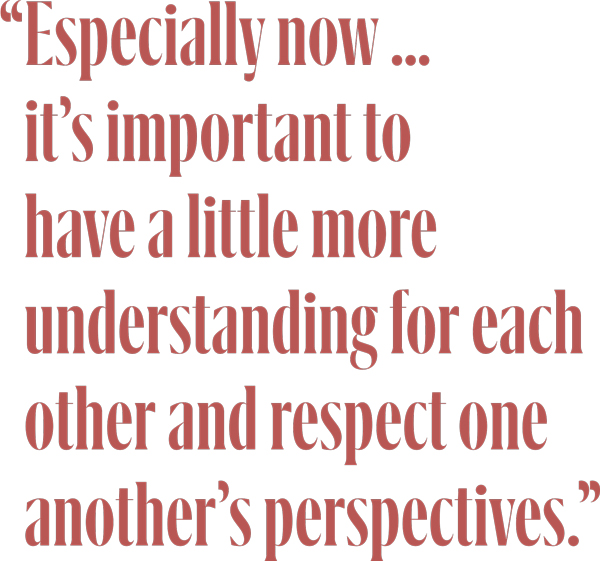
interim director, UNH Education Abroad
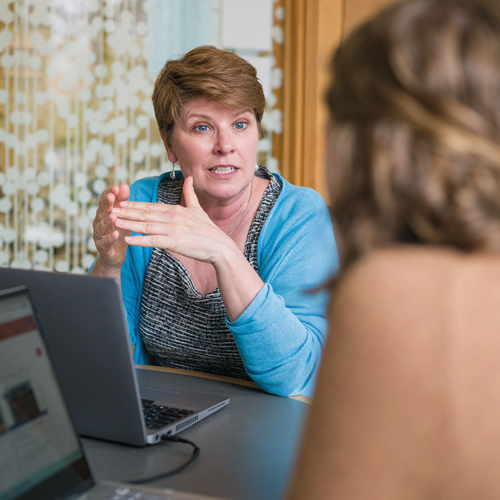
She was initially skeptical of such a change. “For me, nothing can replace being in the physical space — the different sights, the different smells and sounds,” she says. “But you can become more intentional about the outcomes of international learning if you do it remotely.” Meijer envisions pairing UNH students in a classroom in Durham with peers in Korea, or the Netherlands, for example. The students would attend synchronous courses in subjects like political science or sustainability — topics that are global in scope but rife with nuances specific to each country — and collaborate on projects designed around remote international learning.
Studying Korean politics or Dutch approaches to sustainability issues — and hearing those ideas firsthand from students in their respective countries would help foster that “global experience.” Though more limited in scope and narrowly structured, such programs could augment traditional study abroad programs.
“It’s a starting point. By giving students a remote global experience, they can then choose to go meet in-person the peers they’ve met remotely,” she says.
Ultimately, the aim is to open up the study abroad experience to more students, especially students of color, students with disabilities, and others for whom traditional study abroad programs haven’t seemed accessible. Doing so requires resources — scholarships and connections both in Durham and around the world. More options help Meijer’s office find study abroad programs that are the right fit “academically, financially, personally, and professionally” for students. And while most students who study abroad follow a traditional path — taking a semester’s worth of courses at a university — others find unique ways to get the most from their travels.
“We had a student in Spain who volunteered with a youth soccer club while she was there, and we’ve had students in the past who taught English while they were abroad,” Meijer says. “There are still too few students who take advantage of internship opportunities abroad while taking courses. There’s a wide variety of experiences.”
Many former study abroad participants join the University’s Global Ambassadors Program and act as peer mentors for future study abroad cohorts. Others volunteer to mentor international students studying at UNH. “They’re paying it forward and helping that student get situated and feel more comfortable. They know what that student is going through, and it’s a big deal,” says Meijer.
Abbott is one of the many donors who support study abroad programs based on their own international experiences. At UNH those experiential learning opportunities are increasingly becoming an essential part of a well-rounded undergraduate experience, augmenting what students learn on campus with the experience of living and studying in a foreign place, navigating not just academics but also daily life. The idea of international learning has also come to include doing good abroad. A partnership between the Changemaker Collaborative and UNH Global, the UNH Emeriti Council Student International Service Initiative Fund (EC-SISI) enables students to bring their knowledge and enthusiasm to solve real-world problems in developing areas. Students work alongside faculty mentors to identify a social, environmental, or economic problem and then partner with regional stakeholders and/or international non-profits to develop a project geared at mitigating the problem. The EC-SISI grants (from $3,000 to $10,000) provide money to augment the student groups’ own fundraising activities, and awarding is based on the merit of project applications. The fund was created with support from Mel Rines ’47, longtime board member and benefactor, who was inspired by a presentation by a student group on a project they completed in Peru. “I was impressed by the professionalism I saw in the students and the impact of their work,” Rines has said. “I thought to myself, ‘I want to help more groups do work like that.’” Since 2015, EC-SISI (unh.edu/sustainability/ecsisi) has supported more than 103 student projects, ranging from solar energy education at a school in Ghana to clinical health services in West Africa.
For Sid Nigam ’16 and a group of fellow student-engineers, EC-SISI allowed them to develop an aquaponics system in Costa Rica. The grant helped he and the rest of the team (dubbed Project Oasis) — Paige Balcom ’16, Will Tavares ’16 and Allison Wood ’16 — pay for travel and living expenses, as well as project supplies for the 10-day trip their senior year to the town of Uvita. “The town was a good fit for our aquaponics system, which was designed to make sustainable vegetables and fish more accessible to people in need of fresh food and better nutritional resources,” Nigam recalls. He credits the project — and EC-SISI’s support — for success in Uvita, and also for his own professional achievements. “Our work with Project Oasis helped me land a full scholarship for my master’s program. It wasn’t just about engineering concepts like computational fluid dynamics; it was about helping a community, thinking about user-centered design and working with different stakeholders in that community,” Nigam recalls. “Grants like EC-SISI really helped us achieve all that we set out to accomplish.” After a pandemic-lull in travel, in-person EC-SISI projects are once again active. This summer, four social work majors will travel to Kenya to facilitate sexual and reproductive health workshops for adolescents in Kenya, where teen pregnancy has increased dramatically. Donors like Abbott and Rines believe the international experience as part of an undergraduate career is a must in today’s global society.
“It’s important to immerse yourself in another culture and at a young age… to be able to break bread and interact with families in another country. I think it’s one of the most important things a college student can do,” says Abbott.
Friends on the Field
“It was a much more stringent approach, compared to what we saw here in the U.S.,” she says. “It was very challenging. You couldn’t just form connections by sitting next to somebody.”
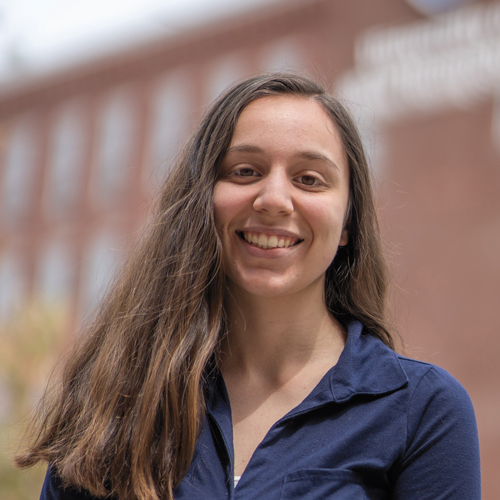
“We were all learning together, and it was a great way to meet people,” she says. “I’m definitely a shy person, but being in the same boat with these people — learning a new sport in a new country — it was a really important bonding experience. I felt more comfortable in myself and my abilities.” Dublin covers approximately 45.5 square miles, about half the size of Boston, and by the end of her stay, Anastasi was navigating the city without a map.
Also a beneficiary of the Ellsworth scholarship, Anastasi gained new perspectives in the classroom as well. Though a biotech major, her coursework in Dublin focused on the humanities and included a course on Irish history. “We don’t learn a lot about Ireland here in the U.S., and when we do, it’s mostly from the English perspective. It was interesting to hear Irish history, and the history of certain rebellions, from the Irish perspective. It gave me the opportunity to open my mind and put myself in someone else’s shoes.”
Lasting Relationships
Their friendship was instantaneous, LaRocque recalls.
“She was like my counterpart — our thoughts, our values, our beliefs were just so connected, right out of the gate. It was like we were living similar lives in separate cultures,” she says. The friendship spread to other students in the study abroad program. LaRocque and Anna hosted parties each week, “and suddenly all these UNH students were hanging out with other Hungarian students, and Anna and I were the thread.”
That bond has grown during the last 16 years. LaRocque has been back to Budapest two times since then, and she and Anna have attended each other’s weddings and travelled together with their families throughout Europe. The connection has framed how LaRocque sees international events. The Russian invasion of Ukraine has put Hungary at the top of her mind. The two countries share a border, and the latest news from Ukraine makes her think of Anna and her family. “It’s not just a thing that’s happening on the news,” she says. “I think, ‘What if that were Anna and her kids?’ … Having that perspective gives you empathy for people in any part of the world.”
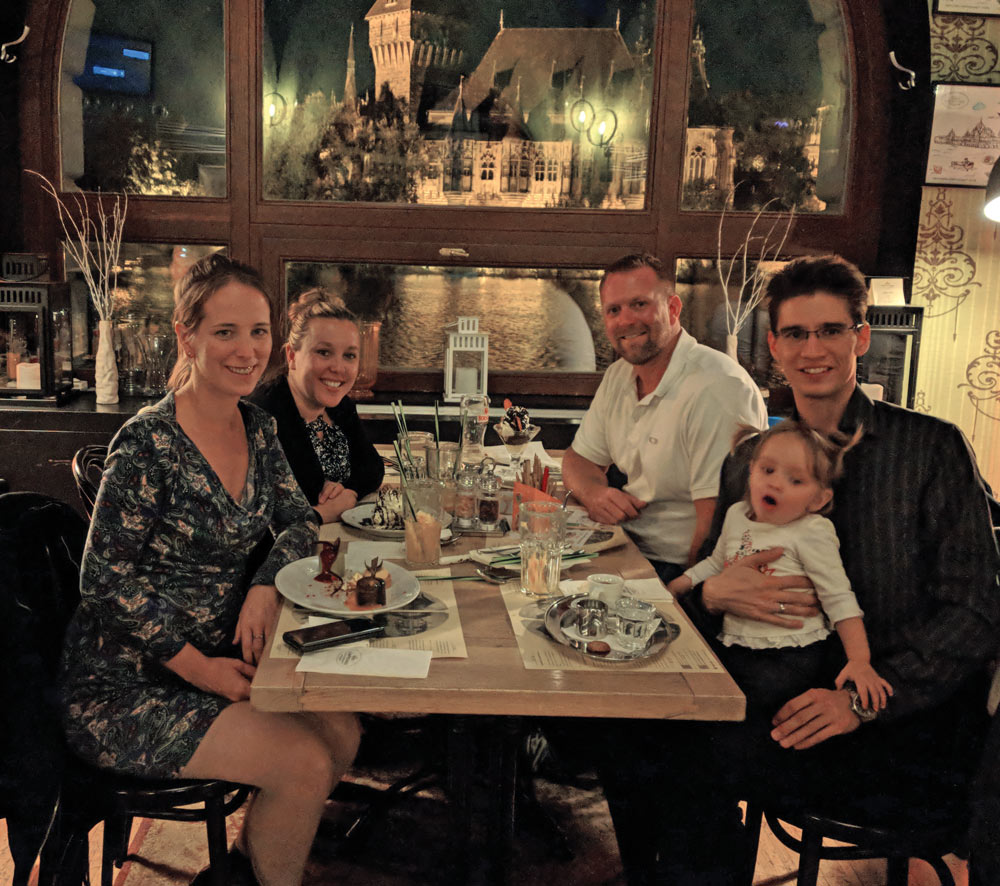
Originally a History major, he switched his focus to German language and literature after his year abroad. It was the culture that affected him most. “Art, music, museums, it was all readily available to anyone, which impressed me greatly,” he says. He went on to earn his Ph.D. at the Free University of Berlin. Unable to find a teaching position in the U.S., he remained in Germany. He worked as a translator and interpreter for several years before becoming a professor of technical English in 1978.
“I came back to Germany because I ended up getting a good-paying job,” he says. “And then I married a Berliner and we had two sons.” It’s a path that might not have been apparent, if not for his year abroad. “I can’t help but think of John Lennon’s saying, ‘Life is what happens when you’re making plans.’ That’s what happened to me — I had never intended to stay here this long.”
Paolini has found herself on a similar path. She initially planned to attend law school after completing her undergraduate degree, but her semester in Seoul has sparked a long-term interest in learning and teaching languages. She plans to return to the city to teach English for a year before pursuing a graduate degree in East Asian languages.
Jaewon plans to join her, too. “He’s an international politics major, and our tentative plan is to come back to the States together and get graduate degrees,” she says. Her family hopes she’ll stay local and get a job in Boston, but Paolini knows her ambitions aren’t limited to her backyard. “I love language learning and traveling, meeting and helping people. That’s what I want to do.”